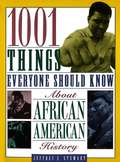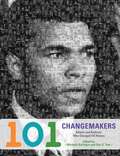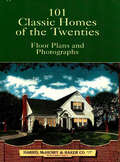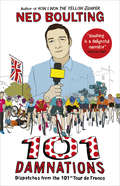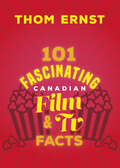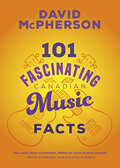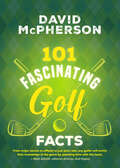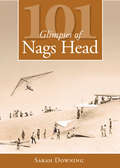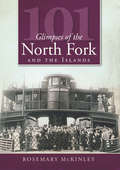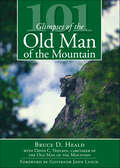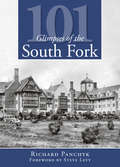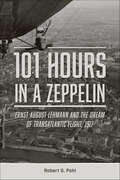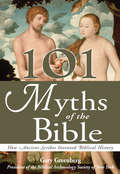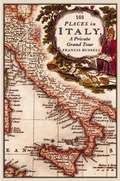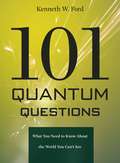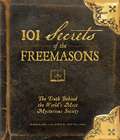- Table View
- List View
1001 Things everyone should know about African American History
by Jeffrey C. StewartHere is a fact-filled trip through five hundred years of African American history, divided into six broad sections: Great Migrations; Civil Rights and Politics; Science, Inventions and Medicine; Sports; Military; Culture and Religion.
1001 Things to Love About Military Life
by Starlett Henderson Holly Scherer Tara Crooks Kathie HightowerA first-of-its-kind celebration of military life, 1001 THINGS TO LOVE ABOUT MILITARY LIFE chronicles some obvious and not-so-obvious traditions, advantages and experiences military members, veterans and their families share.Full of heart-warming vignettes, laugh-out-loud lists, stories and quotes from military members and family members, and photos that speak a thousand positive affirmations, this inspirational look at those who dedicate their lives to serving perfectly illustrates why it is a profession and lifestyle to love.You'll find practical truths most service members wouldn't want to live without and learn the unique outlooks, services and advantages military life provides. Military or civilian, you'll experience the community and personal growth that the military offers.Whether you have a friend or loved one in the military, you're a service member ready to head out on duty, a spouse gearing up to take charge of the household, a veteran in need of a few good laughs, or a new recruit looking for encouragement, this book provides inspiration and insight into the lives of today's dedicated and courageous military families.
1007 Bharat Aur Samkalin Vishwa - 2 class 10 - Himachal Pradesh Board: 1007 भरत और समकलीन विश्व - 2 कक्षा 10 - हिमाचल प्रदेश बोर्ड
by Himachal Pradesh School Siksha BoardThis book is the basic text book of subject social science prescribed by the himachal pradesh board for the students of class 10th. The accessible version of the book doesn’t leave any part of the book. Students and aspiring civil servants must read this to get success in the state and national level examinations.
1008 Samkalin Bharat - 2 class 10 - Himachal Pradesh Board: 1008 समकालिन भारत - 2 वर्ग 10 - हिमाचल प्रदेश बोर्ड
by Himachal Pradesh School Siksha BoardThis book is the basic text book of subject social science prescribed by the himachal pradesh board for the students of class 10th. The accessible version of the book doesn’t leave any part of the book. Students and aspiring civil servants must read this to get success in the state and national level examinations.
1009 Aarthik Vikas Ki Samajh class 10 - Himachal Pradesh Board: 1009 आर्यिका विकास की समाज कक्षा 10 - हिमाचल प्रदेश बोर्ड
by Himachal Pradesh School Siksha BoardThis book is the basic text book of subject social science prescribed by the himachal pradesh board for the students of class 10th. The accessible version of the book doesn’t leave any part of the book. Students and aspiring civil servants must read this to get success in the state and national level examinations.
101 Chambers: Congress, State Legislatures, and the Future of Legislative Studies
by Peverill Squire Keith E. HammThe book compares and contrasts Congress and the state legislatures on histories, fundamental structures, institutional and organizational characteristics, and members. By highlighting the vast array of organizational schemes and behavioral patterns evidenced in state legislatures, the authors demonstrate that the potential for the study of American legislatures, as opposed to the separate efforts of Congressional and state legislative scholars, is too great to leave unexplored.
101 Changemakers: Rebels And Radicals Who Changed U. S. History
by Michele Bollinger Dao X. TranIn the great tradition of Howard Zinn, 101 Changemakers offers a "peoples’ history” version of the individuals who have shaped our country for middle school students. In the place of founding fathers, presidents, and titans of industry, are profiles of those who courageously fought for social justice in America: Tecumseh, Harriet Tubman, Mark Twain, César Chávez, Rachel Carson, Harvey Milk, Henry Wallace, and many more. 101 Changemakers aims to provide young students with new ways of understanding how history is written and made.
101 Classic Homes of the Twenties: Floor Plans and Photographs (Dover Architecture)
by McHenry Harris Baker Co.Originally published in 1925 by the Harris, McHenry & Baker Company of Elmira, New York, this authentic plan book advertises 101 "modern homes," selected from several thousand submitted designs. Chosen for aesthetic appeal as well as utility of arrangement and economy of construction, the houses encompass a truly impressive array of sizes and styles. Now this meticulous reproduction of the company's plan book offers modern readers a look back at these charming residential homes of the 1920s.Detailed floor plans with measurements and an actual photograph of the completed dwelling accompany each model. Designs include "The Stratford," a Tudor-style brick-and-stucco home with a library and servants' quarters; "The Northcliff," a three-bedroom Dutch colonial with a sun parlor; "The Belvedere" and "The Strathmore," attractive two-family homes; and many others.Invaluable for restoring residences remodeled in the past, this handy volume will be of particular interest to owners of houses built in the 1920s as well as to restorers and preservationists in search of authentic plans.
101 Damnations: Dispatches from the 101st Tour de France
by Ned BoultingJoin Ned Boulting as he reports on his dozen-th Tour de France, an event in which blokes do amazing things on bikes, and, we’re oft told, the biggest annual sporting event in the world.101 Damnations is a chance to relive the 2014 race, stage for stage, fall after fall, tantrum by tantrum; just the good bits mind, without all the aerial shots of castles. Or sunflowers. (Though it does wax lyrical about some stunning Alpine scenery . . . and, with the race starting in Yorkshire, even some stunning scenery not far from Bradford).From Leeds to Paris (how often do you say that?), Ned details the minutiae of his encounters with the likes of Vincenzo Nibali, David Millar, Chris Froome, Chris Boardman (or ‘Broadman’ as some would have it), Marcel Kittel, Mrs Cavendish (Mark’s wife), Peter Sagan and the rest. Their endeavours, achievements, humour and occasional rancour, sit alongside his own decade-long quest for the ideal end-of-race T-shirt.Ned weaves together the interesting, amusing and unheralded threads of the race itself, and reflects on his own perennial struggle to get round, get on and get by. 101 Damnations encapsulates all that is incredible – and incredibly ordinary – about the greatest race on earth.
101 Fascinating Canadian Film and TV Facts (101 Fascinating Facts #3)
by Thom Ernst101 lesser-known stories to delight Canadian cinema and television fans. Do you know who was in the first on-screen nude scene in a Canadian feature film? Or which David Cronenberg film was raided for obscenity? Why was Oliver Reed arrested while shooting The Brood ? Which iconic Canadian television series was syndicated in over fifty different countries? Which Canadian film critic wrote a full-page retraction after reconsidering a positive review he gave a film? And what role did Canada play in the creation of Dennis Hopper’s Easy Rider? With an eye for the unique and the absurd, 101 Fascinating Canadian Film & TV Facts, from one of Canada’s leading film critics, is a lively and humorous look at the best and the worst, the firsts and the lasts, and the groundbreaking truths behind Canada’s film and television industry.
101 Fascinating Canadian Music Facts
by David McPherson101 true stories to surprise and delight Canadian music fans.Did you know that Serena Ryder played the quietest concert ever from the ocean floor during low tide at Fundy National Park? Or that “I’ll Never Smile Again,” the hit that launched Frank Sinatra’s career, was written by Toronto pianist Ruth Lowe? What about 12-year-old Liberty Silver singing in a reggae band that opened for Bob Marley at Madison Square Garden? Did you know that the title of the Tragically Hip’s 1991 album, Road Apples, is not talking about apples?In 101 Fascinating Canadian Music Facts, author and historian David McPherson shares these and 97 other tales gathered from his more than 25 years working in the music industry. Music lovers and trivia buffs alike will enjoy perusing this collection of stories — collected from coast to coast — to discover surprising facts and hilarious tales from Canada’s music industry.
101 Fascinating Golf Facts (101 Fascinating Facts)
by David McPhersonTee off your season with 101 delightful trivia on the greatest game.Did you know a Canadian coined the term “mulligan” — a noun meaning “do-over” — which many recreational golfers take on the first tee after an errant drive? Or that the creators of one of the greatest board games ever, Trivial Pursuit, also built a devilish golf course north of Toronto? How about this fact: the world’s most expensive public golf course will set you back $1,000 to play just one round. Here’s one more: Scotland, where golf was invented in the Middle Ages, later banned the sport — not just once, but three times.In 101 Fascinating Golf Facts, author, historian, and award-winning golf journalist David McPherson shares these stories and 97 more fascinating and fun tales that illustrate the sport’s rich history, entertaining both golf lovers and trivia buffs alike.
101 Fascinating Hockey Facts
by Brian McFarlane101 fascinating stories about hockey that will enlighten and delight fans. Have you heard about the referee who was dragged back to the rink by an angry mob demanding he change the result? Or the playoff goal that was scored with half a puck? Or the fourteen-year-old who played in a professional game? In 101 Fascinating Hockey Facts, NHL elder-statesman Brian McFarlane tells these and 98 other tales from the rink. Hockey fans will love flipping through this collection, packed with trivia and did-you-knows, to test their knowledge and to find tidbits to share with their friends.
101 Glimpses of Nags Head
by Sarah DowningNags Head boasts a plethora of natural wonders. From an ecologically unique maritime forest to breathtaking coastal dunes, the dynamics of the area corroborate the sentiment Thomas Nixon expressed in his 1964 classic. Indeed, as early as the 1830s, merchants and planters from the Albemarle region of North Carolina and Southside Virginia brought their families to Nags Head via boat to exchange the oppressive inland summer heat for cool ocean breezes. In this striking photographic collection, Downing illustrates why this scenic spot on the Outer Banks has been beloved for generations by sun-seekers, sightseers and surfers alike.
101 Glimpses of the North Fork and Islands
by Rosemary MckinleyThe North Fork's natural riches have been seducing people for more than four hundred years. The Algonquin Indians--and, later, Dutch and English colonists--first recognizedthe area for its waters rich with clams and fish, its fertile soil for growing crops and its abundant forests to support shipbuilding. Hearing the ocean's call, many have long admired the inlets, creeks and bays and contrast the ruggedness of the Long Island Sound with the tranquility of Peconic Bay. In this pictorial history, local author Rosemary McKinley showcases the nautical history, idyllic seaside settings and lush landscapes of this picturesque country.
101 Glimpses of the Old Man of the Mountain
by Bruce D. Heald David C. NielsenThe Old Man of the Mountain once cast a steady gaze upon the slopes of Franconia Notch. Its profile drew writers, explorers and presidents, delighting all who glimpsed its features. But when it collapsed on May 3, 2003, the Old Man seemed forever lost. Veteran historian Bruce Heald and the last caretaker of the Old Man, David Nielsen, have gathered 101 images from the profile's long history. These one-of-a-kind photos from Nielsen's private collection depict four decades of preservation work, seismic testing by national experts, visits from dignitaries and rare memorabilia. With Nielsen's personal reflections on his life's work and Heald's notes on the history of the Old Man, this volume recaptures the wonder of New Hampshire's great stone face.
101 Glimpses of the South Fork (Vintage Images)
by Richard PanchykLong Island�s South Fork�famous for the Hamptons�is now one of the hottest summer destinations for the wealthiest and most famous Americans. But it wasn�t always so�.When European explorers arrived on Long Island�s southeastern-most shores in the seventeenth century, they shared the land with the Montauket and Shinnecock Indians. The South Fork remained relatively rural until the railroad arrived in the 1870s. In this pictorial history, Richard Panchyk surveys how dramatically the landscape has changed, from the famous Montauk Lighthouse and iconic windmills to the sprawling mansions and opulent hotels, and highlights some of the notable figures who graced these shores, including New York politicians and a plethora of artists and celebrities. Showcasing the South Fork�s famous faces and places, Panchyk reveals this coastal community�s bygone era.
101 Hidden Animals (A\true Book (relaunch) Ser.)
by Melvin Berger Gilda BergerDiscover the 101 most amazing disguises in the animal kingdom!The fifth book in the 101 ANIMAL series, 101 ANIMALS IN HIDING, will feature some of the most extraordinary creatures in nature. Featuring large full-color photos of camouflaged animals, see insects, reptiles, mammals, birds, and fish blend into their backgrounds. Learn how and why these amazing animals have developed these adaptations.
101 Hours in a Zeppelin: Ernst August Lehmann and the Dream of Transatlantic Flight, 1917
by Robert S. PohlThe Robert Wichard Pohl letters, which are the basis of this book, have never before been translated or published.Pohl provides a rare personal account of life aboard a WWI airshipThis was the first flight to exceed 100 hours, and to prove that Zeppelins were, indeed, capable of flying across the Atlantic Ocean.
101 Myths of the Bible: How Ancient Scribes Invented Biblical History
by Gary GreenbergGreenberg, a lawyer who's also president of the Biblical Archaeology Society of New York, explores how the myths and legends of neighboring cultures are built into the foundations of the modern monotheistic religions. He describes a long and continuous relationship between ancient Israel and Egypt, examining Old Testament stories to link Egyptian motifs and mythology to Hebrew interpretation of its earliest history. For his study, he looked for three kinds of biblical stories: those with at least two contradictory accounts; those with parallels in earlier myths and legends; and those involving incidents "that simply couldn't be true. " Annotation c. Book News, Inc. , Portland, OR (booknews. com)
101 Places in Italy: A Private Grand Tour
by Francis Russell"The author has achieved the near impossible...a must-squeeze-into-hand-baggage or the back pack."--House and Garden"A minor classic."--The Times Literary SupplementThis personal, and wonderfully well-informed, selection of the most rewarding towns, cities, villages, and individual monuments in Italy is the definitive guidebook for the discerning traveler. The author has been visiting Italy, for study, for work, and for pleasure, for over fifty years, and is the perfect companion for those who want to know about more than the obvious attractions.As well as comprehensively covering the finest sights in the major tourist centers of Rome, Florence, Venice, and elsewhere, Francis Russell discusses and describes the neglected, or little-known, masterpieces that are still to be found the length and breadth of the Italian peninsula. In a book that will educate and astonish the expert as surely as it will guide and inform the first-time visitor, the author chooses and explores palaces and gardens, city squares and lonely churches, frescoes and altarpieces, great museums and tiny ruins that together provide a richly textured portrait of a country where the history and patterns of civilization lie more thickly than anywhere else on earth.This book will immeasurably enhance and enrich the visitor's experience of the most visited country in the world, by virtue of its sensitivity, its wisdom, and its deep knowledge, and by means of its vivid, eloquent, and entertaining exposition.Francis Russell was educated at Oxford. He is deputy chairman of Christies and specializes in Old Master and Italian paintings.
101 President Jokes
by Melvin BergerGet ready for a parade of Presidential humor! From George Washington to George Bush, here are 101 favorite jokes by and about our Presidents.
101 Quantum Questions: What You Need To Know About The World You Can't See
by Kenneth William FordThis reader-friendly, richly illustrated book provides an engaging overview of quantum physics, from "big ideas" like probability and uncertainty and conservation laws to the behavior of quarks and photons and neutrinos, and on to explanations of how a laser works and why black holes evaporate.
101 Reasons to Love the Cowboys
by Ron Green Jr.A collection of the greatest games, moments, and personalities from the Dallas football team’s history, featuring stunning photography.The Dallas Cowboys—“America’s Team”—shares the record for most Super Bowl appearances (eight) with the Pittsburgh Steelers and recorded twenty consecutive winning seasons (1966–85), in which they only missed the playoffs twice (1974 and 1984), an NFL record. From owner Jerry Jones to such coaches and players as Tom Landry, Jimmy Johnson, Roger Staubach, Troy Aikman, and Emmitt Smith, not to mention those gorgeous cheerleaders, the Cowboys have brought unforgettable sportsmanship and Texas swagger to professional football. 101 Reasons to Love the Cowboys captures the unforgettable games, the historic moments, and the larger-than-life personalities who have helped define the sport of professional football. Accompanied by stunning vintage and contemporary photography, this book is a treasure for casual football fans and devoted Cowboys fans alike.
101 Secrets of the Freemasons: The Truth Behind the World's Most Mysterious Society
by Barb Karg John K YoungFrom the illustrious George Washington and the infamous J. Edgar Hoover to brilliant imaginer Walt Disney and bad boy of baseball Ty Cobb, Freemasons have influenced every aspect of American life. Yet this secret society remains as controversial and mysterious as ever. In this book, you'll learn the truth about:The power and meaning behind the symbols, rites, and ritualsAlleged connections with Jack the Ripper, the KKK, and the Holy GrailFreemasons vs. the NazisThe centuries-long rivalry with the Catholic ChurchFreemasonry's growing influence here and abroad As the largest - and oldest - fraternal organization, the Freemasons will continue to shape the world we live in for the foreseeable future. With this tell-all guide, you'll unravel the mystery of this intriguing society - one secret at a time!
